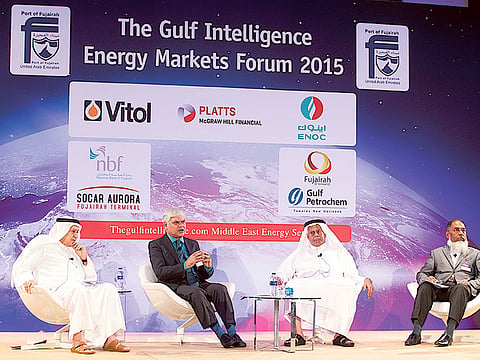Deregulation of fuel prices a key moment for UAE energy policy
Energy sector has robust foundations to stand firm in a volatile energy market

Fujairah: The introduction of the deregulation of fuel prices in the UAE is a key moment for energy policy in the UAE and has made the nation a pioneer in energy exporting nations in the area of energy subsidy reform, a top official from the Ministry of Energy said in Fujairah on Thursday.
“While energy subsidies can generate short term benefits, they lead to greater adverse consequences, impeding market functions, creating artificial prices, decreasing sustainability and limiting the growth of clean energy,” said Matar Al Neyadi, Undersecretary of the Ministry of Energy and Chairman of the Gasoline and Diesel Prices Committee.
Speaking at the 5th Gulf Intelligence Energy Markets Forum in Fujairah, Al Neyadi said that the decision to deregulate fuel prices aligns the nation with its strategic vision to preserve natural resources and increase long term sustainability. “This step places the UAE on par with countries that follow sound economic methodologies, promote a responsible energy market and provide a sustainable future for generations ahead.”
In July, the Ministry of Energy announced that fuel prices would be deregulated and a new pricing policy linked to global prices would be adopted.
Following the decision, petrol prices increased by more than 20 per cent and diesel prices reduced by 29 per cent for the month of August. For September, the fuel prices dropped by more than 8 per cent as the global oil prices fluctuate.
The ministry is expected to announce new fuel prices for October at the end of the month.
Speaking about the power generation sector, Al Neyadi said the UAE is gaining momentum in the delivery of a sustainable, emission free electricity generation. “By 2021, more than 24 per cent of the electricity will be provided by peaceful nuclear energy and renewable energy. This will give energy policymakers in the UAE a key advantage in preserving the valuable natural resources of the nation,” he said.
“In parallel, the UAE will continue to invest in its oil and gas sector. In the past, it has led the field in many key innovations and has built its own path when it comes to improving the environmental impact of the sector as well as improved level of energy security.
“A lot of work still lies ahead but we are confident that the energy sector has robust foundations as well as the right tools and policies to stand firm in a volatile energy market.”
In a snap poll conducted during the event on oil prices, majority of people said the brent would remain in the [$]40s at the end of 2015 and volatility to continue in the next 15 months. The forecast for 2016 was predicted to be $50 a barrel.
Abdullah bin Hamad Al Attiyah, former Qatar Energy Minister and Chairman of the Abdullah Bin Hamad Al Attiyah Foundation for Energy and Sustainable Development, said the GCC (Gulf Cooperation Council) region should be interlinked for gas supply.
“We should link the whole GCC not only with gas connection but also with power grid. It has not been a success. There is a great demand for gas for power generation,” he said.
Sign up for the Daily Briefing
Get the latest news and updates straight to your inbox



